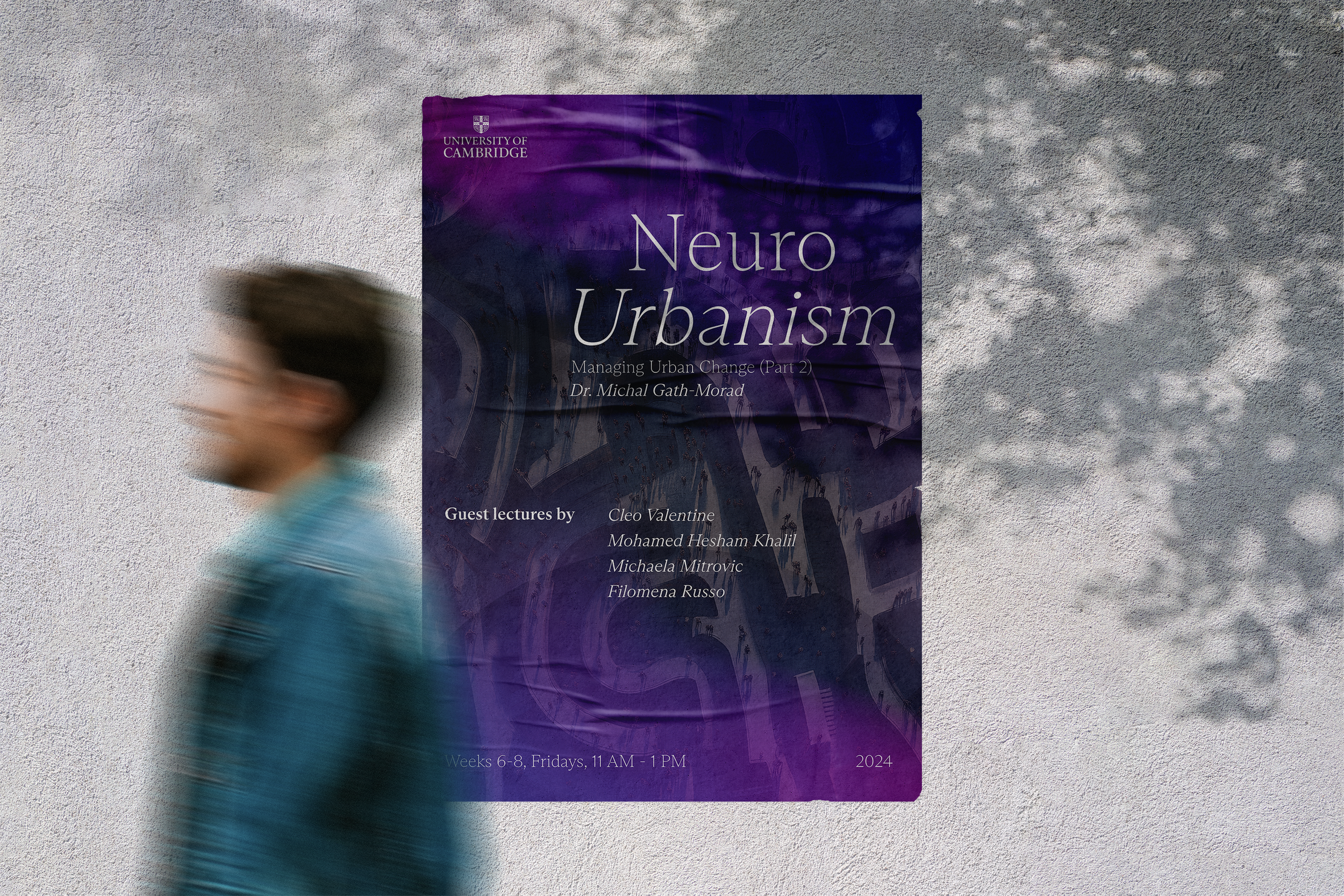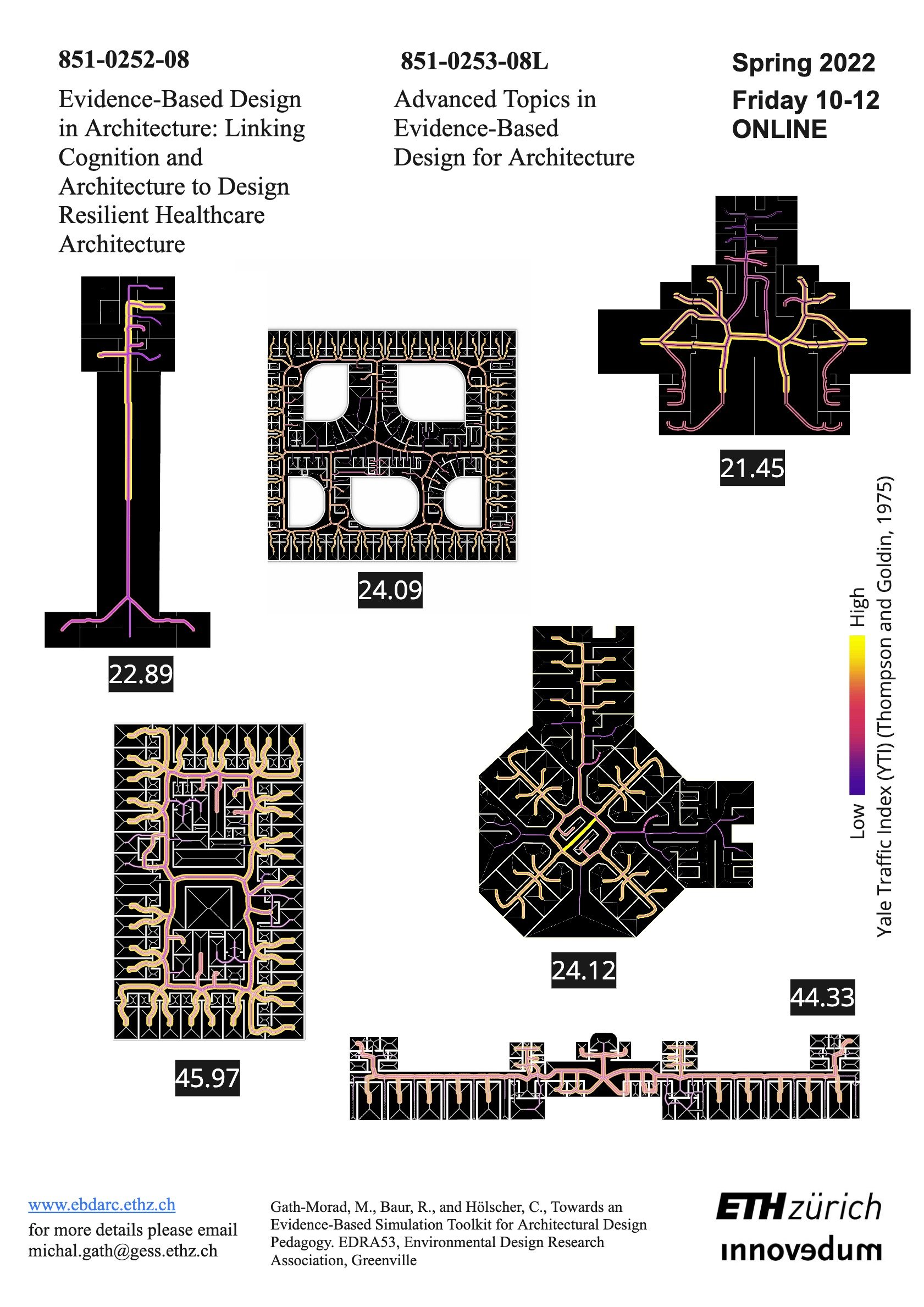Video credit: iART ag, Music: Victor Moser, In collaboration with the Chair of Cognitive Science, ETH Zurich and the SCDH, Switzerland
Mission
Cambridge Cognitive Architecture, led by Assistant Professor Dr. Michal Gath-Morad—an architect with a Ph.D. in cognitive science—spearheads transdisciplinary research fusing architectural design and cognitive science. Our mission is to decode how the architectural design of physical environments affects human cognition, behaviour and social dynamics.
We are dedicated to inspiring and empowering design stakeholders with human-centred, cognitively-grounded, and evidence-based design knowledge and tools. Our ultimate goal is to facilitate the creation of humane built environments that prioritise legibility, inclusivity, and well-being, all while examining how evidence-based tools influence design creativity, communication and outcomes in real-world design contexts.
Team
Xiangfeng Zhou
MPhil Student (2023-2024)
NeuroUrbanism in SEA
MPhil Student (2023-2024)
NeuroUrbanism in SEA
Research
areas
Research at Cambridge Cognitive Architecture focuses on three main areas, centred around three interrelated research questions explored within various domains, ranging from healthcare environments to urban spaces:
(1) The Impact of Design on Spatial Cognition: How does the architectural or urban design of physical built environments impact inhabitants’ cognition, behaviour, and social dynamics?
(2) Developing Evidence-Based Design Tools: How can empirical findings regarding cognition and behaviour be effectively integrated into architectural design practice to create evidence-empowered and human-centred built environments?
(3) The Impact of Evidence of Design Cognition: What happens when architects employ evidence-based design knowledge and tools? How does it affect design cognition, communication, and design outcomes?
Featured
projects
-

Mobile Living Lab (MLL) for Building Occupancy-Energy Synergy
The project addresses the significant challenge of energy wastage in buildings within the Cambridge estate, where excessive energy consumption for heating and lighting persists despite low occupancy levels associated with post-pandemic work patterns. To address this challenge, the project will use a mixed methods approach comprising (1) easily deployed IoT sensors to accurately map occupancy, environmental and energy patterns in indoor spaces, (2) a behaviour mapping app to capture the type of activities performed, and (3) user-experience survey tools to identify reasons for underutilization.
Team: Michal Gath-Morad, Koen Steemers, Stephen Law, Leonel Aguilar, Jascha Grubel, Tom Howell, Mark Lawrance, Christian Veddeler.
Funding: CambridgeZero and Pressac Communication
-

The DesignMind Toolkit for Cognitively-Informed and Human-Centred Architecture
DesignMind is a toolkit aimed at Integrating empirical evidence into architectural design has to create more humane, legible, and inclusive spaces. DesignMind offers four modules: evidence-based design flashcards, topological and geometric analysis, agent-based simulation, and cognitive walkthrough in virtual reality. The different modules enable users to assess their designs for human-centered criteria like wayfinding, social interaction potential, and nursing efficiency.
Team: Michal Gath-Morad, Raphaël Baur, Christoph Hölscher
-

Simulation-Powered Co-Design for Humane Healthcare Architecture
The project explores how design stakeholders perceive and interact with evidence regarding inhabitants' behaviour in healthcare environments. It examines both the type of the evidence and the medium in which it is communicated, analysing how these factors influence collaboration and mutual understanding between experts and designers.
Team: Michal Gath-Morad, Leonel Aguilar Melgar Raphaël Baur, Kerstin Sailer, Koen Steemers, Ruth Conroy-Dalton, and Christoph Hölscher.
Funding: SNF, Postdoc.Mobility grant number P500PT_206932
-

EVIDENT: Evidence-Based Architectural Design of Emergency Departments
This project explores how the spatial configuration of emergency departments impacts face-to-face interactions among healthcare professionals, influencing their collaboration and care delivery.
Gath-Morad, M., Grübel, J., Baur, R., Aguilar, L. E., Sailer, K., Schmutz, J., Slankamenac, k., Honegger, P., Dalton, R., Sax, H., & Holscher, C. (2024). How the Spatial Design of Emergency Departments Affects Face-to-Face Interactions and Perceived Communication, Collaboration, and Care Outcomes. Manuscript in preparation.
-

Designing affective workplace environments: The impact of typology, contour, ceiling and partition height on cognitive and aesthetic appraisal
Gath-Morad, M., Egli, S., Grübel, J., Steemers, K., Hölscher, C., & Aguilar, L. (2024). Designing Affective Workplace Environments: The Impact of Typology, Contour, Ceiling and Partition Height on Cognitive and Aesthetic Appraisal. Building and Environment, 111928.
-

The role of strategic visibility in shaping wayfinding behavior in multilevel buildings
Gath-Morad, M., Grübel, J., Steemers, K. et al. The role of strategic visibility in shaping wayfinding behavior in multilevel buildings. Sci Rep 14, 3735 (2024). https://doi.org/10.1038/s41598-024-53420-6
-

Attract or repel: how street features shape pedestrians’ leisure walks in cities
Gath-Morad, M., O. Plaut, P., & Kalay, Y. E. (2023). Attract or repel: how street features shape pedestrians’ leisure walks in cities. Journal of Urban Design, 1-21.
-

Beyond the shortest-path: Towards cognitive occupancy modeling in BIM
Gath-Morad, M., Melgar, L. E. A., Conroy-Dalton, R., & Hölscher, C. (2022). Beyond the shortest-path: Towards cognitive occupancy modeling in BIM. Automation in Construction, 135, 104131.
-

The DesignMind Toolkit: A toolkit for evidence-based, cognitively-informed and human-centred architectural design
Gath-Morad, M., Baur, R., & Hölscher, C. (2023). The DesignMind Toolkit: A toolkit for evidence-based, cognitively-informed and human-centred architectural design. In Digital Design Reconsidered, eCAADe conference, 20-22 September 2023, Graz University of Technology Graz, Austria (Vol. 1, pp. 51-60).
-

Visibility matters during wayfinding in the vertical
Gath-Morad, M., Thrash, T., Schicker, J., Hölscher, C., Helbing, D., & Aguilar Melgar, L. E. (2021). Visibility matters during wayfinding in the vertical. Scientific reports, 11(1), 1898
Teaching
Join us
-
Are you interested in pursuing a Ph.D. at the Cambridge Cognitive Architecture research group? We welcome applications from diverse backgrounds, including architecture/engineering, cognitive science, neuroscience, psychology, public health/medicine, computer science, and related fields.
You can explore your research proposals within our core research areas listed above. We highly value applicants with a publication track record and experience in empirical data collection, data analysis/visualization, programming skills, and 3D modeling.
To apply, please contact Dr. Michal Gath-Morad (mg2068@cam.ac.uk) with your research proposal (1-2 pages) and explain why you want to pursue your Ph.D. research with us.
For University of Cambridge's Ph.D. application guidelines and funding sources, visit the links provided.
University of Cambridge's PhD application guidelines
The Gates Cambridge Scholarship
University of Cambridge's PhD funding sources
Please note that applications open in early September, and you should consider both the course deadline within the Department of Architecture and the funding deadline if applicable.
-
Exceptional postdoctoral researchers with high-impact research portfolios relevant to our group's research areas are welcome. Explore competitive funding opportunities from organisations like the British Academy, Leverhulme Trust, AHRC, ESRC, SNSF Post.Doc. Mobility, and more.
-
Practicing architects and pre-Ph.D. researchers interested in summer internships are invited to reach out. Internships can involve applying evidence-based design methods from cognitive neuroscience to real-world projects, resulting in joint publications or post-occupancy analysis reports. We prioritise research that can be published in scientific journals while respecting client confidentiality.
Other opportunities include collaboration on existing projects and experimentation with data collection, analysis, architectural modeling, and creative data visualisation.













